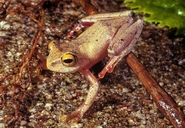|
Description
M 22-24 mm, F 29 mm. Tibiotarsal articulation reaches between nostril and snout tip. Hand with some webbing, foot webbing 1(0-0.5), 2i(0.5-1), 2e(0), 3i(1-1.5), 3e(0.5), 4i/e(1.5-2), 5(0-0.5). Dorsal skin smooth. Dorsally light brown, often uniform. Ventrally at least with some red colour on the feet and thighs. Iris golden-yellow.
Similar species: Similar to many other small brown Boophis and difficult to diagnose by morphology alone. The yellow-golden iris colouration is a relatively constant diagnostic character.
Distribution and Habitat
Country distribution from AmphibiaWeb's database: Madagascar
Ambohimitombo, Andringitra (Imaitso forest), Ranomafana National Park (Andranaroa river, Maharira forest, Ranomena, Vohiparara). Occurs between 900-1500 asl. This species lives in rainforest and breeds along streams (Nussbaum et al. 2008).
Life History, Abundance, Activity, and Special Behaviors
Habits: Males call 2-4 m high in the vegetation along rainforest streams and are usually rather difficult to see. One couple from Vohiparara laid a clutch of dark eggs.
Calls: A series of 11-47 very short, unharmonious notes.
Trends and Threats
Near Threatened: extent of occurrence is probably not much greater than 20,000 km2, and the extent and quality of its habitat are probably declining, thus making the species close to qualifying for vulnerable. It occurs in Parc National d'Andringitra and Parc National de Ranomafana (Nussbaum et al. 2008). Possible reasons for amphibian decline General habitat alteration and loss
Habitat modification from deforestation, or logging related activities
Intensified agriculture or grazing
Urbanization
Habitat fragmentation
Comments
Taken with permission from Glaw and Vences (2007).
References
Glaw, F. and Vences, M. (1994). Amphibians and Reptiles of Madagascar. M. Vences and F. Glaw Verlags GbR., Köln.
Glaw, F., and Vences, M. (2007). Field Guide to the Amphibians and Reptiles of Madagascar. Third Edition. Vences and Glaw Verlag, Köln.
Nussbaum, R., Glaw, F., and Vences, M. (2008). Boophis majori. In: IUCN 2008. 2008 IUCN Red List of Threatened Species. www.iucnredlist.org. Downloaded on 07 April 2009.
Originally submitted by: Miguel Vences and Frank Glaw (first posted 2000-10-24)
Edited by: Henry Zhu (2009-05-05)Species Account Citation: AmphibiaWeb 2009 Boophis majori <https://amphibiaweb.org/species/4349> University of California, Berkeley, CA, USA. Accessed May 28, 2025.
Feedback or comments about this page.
Citation: AmphibiaWeb. 2025. <https://amphibiaweb.org> University of California, Berkeley, CA, USA. Accessed 28 May 2025.
AmphibiaWeb's policy on data use.
|
